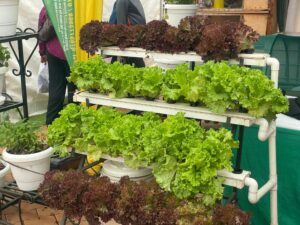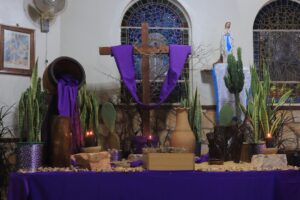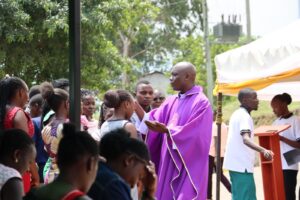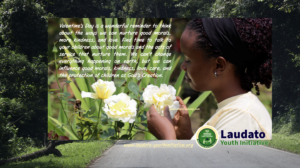October 12th, 2024 started the joy of the Uganda Martyrs 60 years of canonization anniversary with a Hybrid Webinar organized organised by; the Missionaries of Africa – Rome, Embassy of Uganda to the Holy See – – Ugandan Embassy in Rome and the Ugandan Ecclesiastical Community in Rome.
FATHER STANLEY LUBUNGO
Superior General of the M.Afr. opened the well-attended webinar
BISHOP JOSEPH ANTHONY ZZIWA
President of the Episcopal Conference of Uganda gave opening remarks.
ARCHBISHOP PAUL SSEMOGERERE
Archbishop of Kampala gave remarks and extended a vote of thanks.
H.E. YOWERI MUSEVENI
President of the Republic of Uganda congratulated the Church for its role in caring for creation and social justice.
I should say it was a privilege for me to attend such a historical event at the Missionaries of Africa’s Generalate in Rome, focused on the theme “The Blood of the Martyrs: Seeds of Hope for an Integral Ecology.” This event was part of the celebrations marking the 60th anniversary of the Canonization of the Uganda Martyrs. Here, I aim to capture the essence of the presentations and highlight the proactive role of the Laudato Youth Initiative in fostering a climate-resilient Uganda, inspired by the insights shared.

Dr. John Mundell, Director of the Laudato Si Platform, stressed the importance of Africa’s involvement in the Laudato Si Action Platform. He presented it as a source of hope and a call to action for caring for creation. His message resonates deeply with our mission to unite youth from schools, parishes, universities, and dioceses in Uganda to foster environmental stewardship and resilience.
Fr. Joshrom Isaac Kureethadam, SDB, delved into the deep connections between integral ecology and the Church’s social teachings. He highlighted how these principles can serve as a framework for communities engaged in environmental stewardship, advocating for a balanced relationship with nature that reflects our faith. This alignment with the teachings of Laudato Si, Laudate Deum, and the Church’s social teachings provided us with further inspiration.
Don Luigi D’Errico, the Parish Priest of the Ugandan Martyrs in Rome, shared the impactful initiatives of his parish in practicing integral ecology. He depicted the legacy of the Uganda Martyrs as a powerful motivator for ecological conversion, urging individuals and communities to act responsibly towards the environment. This perspective inspired me to think about how we can amplify our efforts and create a greater impact in our own communities.
Sister Begoña Iñara / Msola pointed out the emerging signs of ecological conversion across Africa, showcasing grassroots initiatives that reflect a rising awareness and commitment to sustainability. Her insights instilled optimism about the potential for environmental transformation on the continent, especially considering that the youth represent the largest demographic in Uganda. We recognize that there is much more to be done, and we must rally more support to achieve our goals.
Cardinal Fridolin Ambongo shed light on the struggles faced by modern martyrs, particularly those impacted by the exploitation of Africa’s mining resources. He addressed the difficult realities in the Democratic Republic of the Congo and beyond, suggesting pathways to overcome these challenges through justice and sustainable development.
A
key takeaway from these presentations was the emphasis on “Together.” They highlighted the crucial intersection of faith and ecology, illustrating how the spirit of the Uganda Martyrs can inspire a new generation to embrace environmental responsibility and contribute to a resilient future for Uganda and beyond.
As we move forward, we remain committed to our mission of building a greener Uganda for everyone and fostering collaboration with others. We recognize the urgent need to address the environmental, social, and economic challenges posed by climate change in our country and the world. Our initiative, rooted in the teachings of Laudato Si and the Catholic Church’s social doctrine, seeks to engage in meaningful climate change dialogue and action.

We are aware of the importance of enhancing youth involvement, planning, and representation in mainstreaming climate change concerns within the Church, Ugandan society, and on a global scale. Our efforts will include raising awareness about Catholic Social Teachings, Laudato Si, the Sustainable Development Goals (particularly Goal 13), and our ambitious plan to plant one million trees as part of our “Go Green with Laudato” action plan for 2024.
Our vision is to unite young people to build a climate-resilient Uganda—a land blessed by the Martyrs. Our goal is to redirect youth engagement towards creating positive change in our communities through hard work and determination.
We’ve seen numerous clubs foster hope through community service programs, learning from one another and developing climate change-resilient project prototypes that harness technology for environmental care.
We aim to reflect on the UN mandate on Climate Change and the outcomes of the Conference of Parties (COPs) to inspire renewable energy initiatives and student projects that promote Uganda’s transition to a sustainable energy future.
Additionally, we will continue to educate our youth and communities about practical climate change mitigation and adaptation strategies that are accessible and feasible.
If the Church and government institutions could collaborate more closely with our youth and support our clubs and their initiatives, we could achieve remarkable outcomes. Recently, we organized several activities during the Season of Creation that brought together members of different faith groups to discuss climate change concerns, leading to invaluable lessons and insights.
The reality remains our commitment to fostering environmental stewardship and resilience in Uganda and the world at large remains steadfast, and we eagerly anticipate the collaborative efforts that will propel us toward building a sustainable future.








